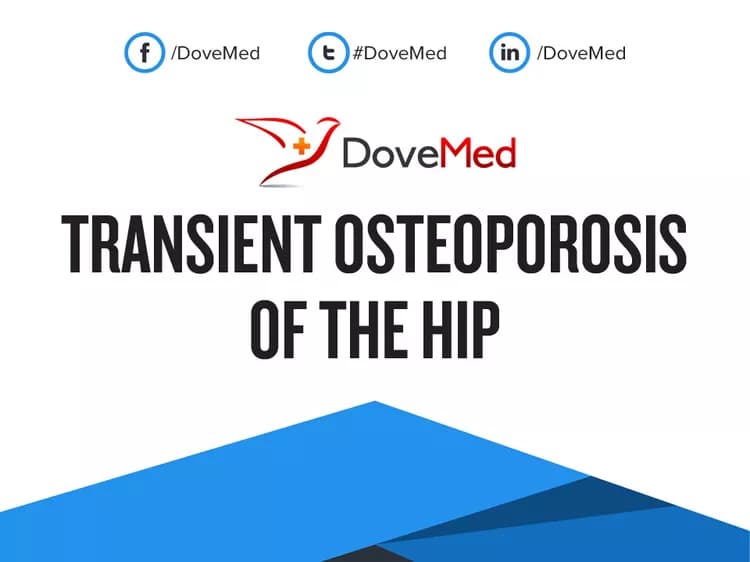What are the other Names for this Condition? (Also known as/Synonyms)
- TOH (Transient Osteoporosis of the Hip)
What is Transient Osteoporosis of the Hip? (Definition/Background Information)
- Osteoporosis is a serious and painful condition that occurs, when the bones in the body become abnormally fragile and frail, which may increase the risk of bone fractures
- Transient Osteoporosis of the Hip (TOH) is a rare condition in which, there is a temporary bone loss, in the upper part of the thighbone (femur)
- TOH is a reversible form of osteoporosis and hence, it usually resolves on its own, within one year
Who gets Transient Osteoporosis of the Hip? (Age and Sex Distribution)
- Transient Osteoporosis of the Hip is more likely to develop in middle-aged men, or in women,during the later stages of pregnancy, or early postnatal period
- The condition affects all individuals, irrespective of race or ethnicity
What are the Risk Factors for Transient Osteoporosis of the Hip? (Predisposing Factors)
Common risk factors associated with Transient Osteoporosis of the Hip include:
- TOH is predominantly seen to occur in middle-aged men, between the ages of 30 and 60 years
- Women, who are in their late stages of pregnancy, or early post-delivery period, have an increased risk
It is important to note that having a risk factor does not mean that one will get the condition. A risk factor increases ones chances of getting a condition compared to an individual without the risk factors. Some risk factors are more important than others.
Also, not having a risk factor does not mean that an individual will not get the condition. It is always important to discuss the effect of risk factors with your healthcare provider.
What are the Causes of Transient Osteoporosis of the Hip? (Etiology)
Currently, the underlying cause of Transient Osteoporosis of the Hip is unknown. However, several theories have been proposed by researchers, and these include:
- Obstruction of blood vessels that surround the hip
- Hormonal imbalances
- Abnormal stress on bones, due to various reasons
What are the Signs and Symptoms of Transient Osteoporosis of the Hip?
Signs and symptoms of Transient Osteoporosis of the Hip include:
- Sharp pain in the hip; the pain is especially severe, when pressure/weight is applied
- Decreased range of hip motion
How is Transient Osteoporosis of the Hip Diagnosed?
Diagnostic methods that a physician may use to help diagnose Transient Osteoporosis of the Hip include:
- X-ray of the hip: X-rays are radiations that are used to produce images of the hip. This can help the physician rule out other possible causes of hip discomfort. However, x-rays may not produce images of sufficient clarity, during the later stages of Transient Osteoporosis
- Magnetic imaging (MRI): An MRI is a detailed scan that uses a magnetic field to produce images that allow a physician to view any damage to the bones and soft tissue, aiding them to confirm the diagnosis
Many clinical conditions may have similar signs and symptoms. Your healthcare provider may perform additional tests to rule out other clinical conditions to arrive at a definitive diagnosis.
What are the possible Complications of Transient Osteoporosis of the Hip?
Complications of Transient Osteoporosis of the Hip could include:
- Fracture of the hip
- Chronic or permanent disability of the hip joint
How is Transient Osteoporosis of the Hip Treated?
Nonsurgical treatment measures include:
- Non-steroidal anti-inflammatory oral medications, such as Ibuprofen and naproxen, may be used to help decrease the pain and inflammation
- Assistive devices, such as a cane or walker are recommended. This may help the individual in performing some of their everyday activities
- It is important to begin some light motion exercises after the symptoms have decreased. Physical therapy may help restore strength, as well as provide flexibility, in the muscles
How can Transient Osteoporosis of the Hip be Prevented?
A few measures to help prevent Transient Osteoporosis of the Hip include:
- Sufficient consumption of calcium and vitamin D
- Exercise regularly to decrease bone loss
What is the Prognosis of Transient Osteoporosis of the Hip? (Outcomes/Resolutions)
- If Transient Osteoporosis of the Hip is treated early, a majority of the individuals can expect the symptoms to resolve, within 6-12 months
- In a small percentage of individuals, TOH may recur
Additional and Relevant Useful Information for Transient Osteoporosis of the Hip:
Primary osteoporosis is a type of osteoporosis that typically occurs in postmenopausal women. It is associated with a decline in estrogen levels that happens, when a women experiences menopause.
Related Articles
Test Your Knowledge
Asked by users
Related Centers
Related Specialties
Related Physicians
Related Procedures
Related Resources
Join DoveHubs
and connect with fellow professionals


0 Comments
Please log in to post a comment.